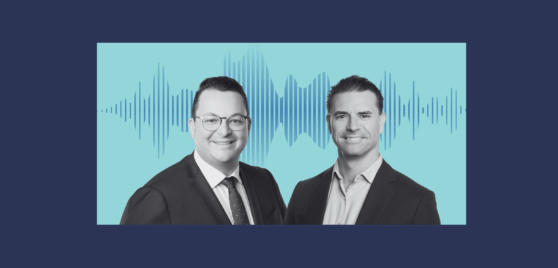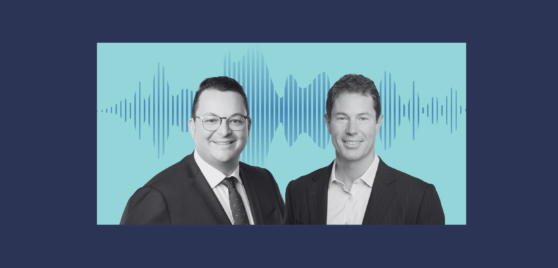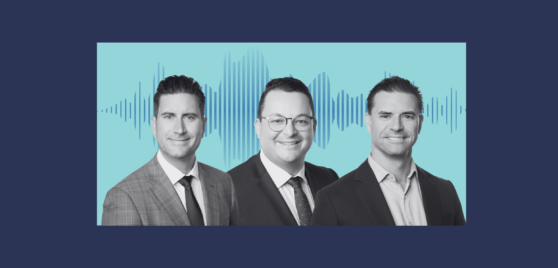Featuring Marc Whittaker
LISTEN
READ
Portfolio manager Marc Whittaker talks to Jason Guthrie about how IML’s small-mid cap funds performed over the quarter and financial year. He also discusses performance of key stocks and a new position for the funds.
Follow our podcast, ‘Navigating the Noise’ on Spotify, Apple or Amazon to be notified of new episodes.
 |
 |
 |
Lightly edited transcript – Recorded on 8 July
Jason Guthrie: Hello and welcome to Navigating the Noise, a podcast by Natixis Investment Managers where we bring you insights from our global collective of experts to help you make better investment decisions.
I’m Jason Guthrie and today I’m joined by Marc Whittaker, portfolio manager, and as of 1 July this year, he is now leading the IML small and mid-cap portfolio management team. Today, the plan is to discuss the market and activity over the recent quarter, but also how the small and mid-cap funds have performed for the full year into 30 June.
Marc, welcome back to the podcast. Thanks for making the time to chat today.
Marc Whittaker: Thanks for having me again, Jason. It’s always a pleasure.
Jason: Hard to believe we’ve just flown through another quarter, and the end of the financial year here in Australia was obviously a pretty volatile quarter for share markets. We saw that sell-off in early April after the US tariff announcements, and we’ve subsequently had this incredible rebound in equities across the globe. I think both large and small cap benchmarks here in Australia were up around 9% for the quarter, so very strong performance. Maybe to kick things off, how did you see the quarter, Marc, and what were some of the main developments that investors should be across?
Marc: What didn’t happen in the quarter is probably the question to ask. When you think about it, we had the Liberation Day, of course, trade agreements being signed, a federal election here as well with the old government returned, so there are some implications there. We also saw rate cuts in Europe and Australia and other parts of the world, and the conflict in Iran— they’re calling it a 12-day war, I think.
With all that uncertainty, the US economy looks like it’s still sort of chugging along OK. Consumer sentiment is arguably a little bit depressed, but employment and all these other key metrics in the US are holding up ok, so it’s been a very interesting quarter to say the least. I think if you look at the intra-quarter swing, it was something like 18%. So, for the markets, particularly small caps — I’m referring to them in particular— from the lows, there was an 18% bounce. So, up 9% to 10% for the quarter, but dramatic swings, absolutely, as you say.
Jason: So, a lot of noise, but it ended up being a nice positive quarter in the end. Turning to the full financial year, another good year for the team there on the small and mid-caps, with around 10% to 11% depending on which fund — Future Leaders, Small Caps — slightly behind the benchmarks. What were the main factors impacting the portfolios over the full year, particularly your funds?
Marc: Yeah. So, we’re a little bit behind, but in a way, we were reasonably happy with the way the funds performed. If you look at where we lagged behind in the market, it was really in the gold sector. We don’t hold as much gold as the weight of the gold sector in the index, particularly in small caps.
As most of our listeners will know, we are not big holders of small cap resource companies generally, given the volatility, uncertainty, and the gyrations around commodities in general. Gold’s been very strong; I think the gold price itself was up around 40% over that quarter to half year, and I think gold equities were up around 60% on average. So, being underexposed to those gold names hurt us a little bit from a relative point of view, but that’s OK because, as I said, we like to own companies with recurring earnings, resilience about their earnings, and the ability to generate growth and cash flow. We don’t tend to find that in most resource companies. So, we’re happy to maintain that underexposure to gold on an ongoing basis.
We’re happy to own industrial companies that are actually producing things that people want and need. In the mid caps, as you say, Jason, there was quite a dramatic bounce back in equities that quarter. A lot of it was momentum, I would argue, so tech — expensive tech — we’ve tended to avoid that. We like technology, but we’ve tended to own things that we think are reasonably valued. A lot of the really expensive tech names had a strong run into the back end of that last quarter. Companies like TechnologyOne, Next DC, Life 360 — all good companies, but I think very expensive, and they were all very strong performers. So, not owning those names hurt us a little bit as well, from a relative point of view.
Jason: Just coming back to your comments around gold, are there any names in the small mid-caps that you do like that fit the quality and reasonable valuation tilt that you’re looking for?
Marc: The largest holding we have in the gold sector is Vault Minerals (VAU). That’s a gold play in Western Australia. Its key asset is the King of the Hill, and it’s a recent merger between Silver Lake Resources and Red 5. We think it’s pretty well positioned; it’s near the Leonora Basin in WA, which is a key gold mining district. We like it; it looks cheap. It’s had a couple of hiccups with production, as all gold companies do, but it has a long-life asset, and the cost of production is pretty competitive relative to the sector more broadly.
So, we think it’s well positioned. It has had a couple of hiccups, so the price hasn’t moved as dramatically as some of its peers, but we think it looks cheap. At some point, if it doesn’t sort of rerate, we think it probably gets taken out, as we’ve seen a lot of consolidation in that gold space. Gold Road had a bid more recently, so we think that continues, and to us, Vault looks like a key candidate for takeover activity at some point.
Jason: Sure. And just on some of the other strong performers over the quarter, it looks like Austal, which we have spoken about recently with Lucas and the team there on the pod, is really benefiting from that global increase in defence spending. Another one of your holdings there is Electro Optic Systems (EOS). It also looks to have benefited from that defence thematic. Can you tell us a bit more about that company?
Marc: Absolutely. What we’ve seen, certainly in the recent Iran-Israel confrontation, and what we’re seeing with Russia and Ukraine, is that it’s all about drones. Whoever has the best drones wins— that’s probably the new mantra on the battlefield. So, EOS is really all about remote weapon systems and targeting technology. The one thing with drones is that they’re pretty hard to hit if you’re using conventional weapons, and taking drones out can be quite difficult.
If you’re using missiles, those are very expensive, but drones don’t cost that much money. So, I guess the bang-for-your-buck equation can be quite misaligned. One of the best ways to shoot them down is by using bullets, but getting that accuracy can be quite difficult. What EOS does is build these remote weapon systems with the ability to target lock on to the targets very accurately, allowing you to take down these drones or moving targets from a long distance away.
The key driver for that particular company in more recent times is that they’re starting to announce contract wins with European customers, Middle Eastern customers, and so forth. That has been a real tipping point for the stock, and as a consequence, the share price reaction has been quite strong. So that was a good performer for us, particularly in the Smaller Companies Fund, over the last 12 months.
Jason: OK, great. Obviously we’ve discussed some of the highlights over the quarter. Can you talk about any names that may have disappointed and were key detractors for returns, and perhaps why things didn’t work out and how you’re managing those positions?
Marc: Yeah. Amotiv (AOV) is one we like, which is an aftermarket auto parts distribution business. If you think about people who might like to do some DIY on their cars, they might be familiar with the brands like Ryco and Wesfil and Brown & Watson on the lighting and electrical side — Ryco and Wesfil for filtration and powertrain of your car, and undercar. That’s been a little bit disappointing.
If you look at new car sales over the last little while, they’ve been a bit soft. So, there’s a bit of exposure to new car sales with Amotiv, and that’s hurt their earnings a little bit. They’ve also got a bit of exposure to New Zealand, where the economy still looks quite moribund. They’ve had quite a few rate cuts there, but those cuts really haven’t come through yet in terms of stimulating economic activity. So, that will come.
We think Amotiv is pretty well placed; it’s very cheap. It’s trading on something like 10 times a dividend yield, closing in on 5% fully franked, which we think is quite attractive. They will be good by the end of it going forward; it’s just about getting through these periods of weak consumer sentiment. Interestingly and comfortingly, new car sales have started to move a bit positively just recently, so we think that’s a good leading indicator for that particular stock.
ReadyTech is another one we own that has been a little bit disappointing. I think everybody’s probably familiar with TechnologyOne — ReadyTech is really a smaller cap version of TechOne. It’s an enterprise software as a service business focusing on education, government, and legal verticals, and the growth has been pretty good. It tends to grow between 10 and 15%.
Similar to what we were talking about with Vault, it just needs to announce a couple of more contract wins. The market has been waiting for them to announce a few more contracts, and they haven’t come through yet for a number of reasons. We think those contracts are just delayed; they are coming, they’ve just being pushed back. Governments have been a bit more budget conscious, so they’ve pushed some contracts into the new financial year and things like that.
But that’s a very cheap way to play, and a good quality way to play, what we believe is a strong thematic, which is software as a service. To us, it’s just a quality way of playing that space at a very reasonable price. Both of these names are very cheap, and if we look at some of our stronger performers from the previous quarter, stocks like Tabcorp and Kelsian were also in the sin bin for a little while because earnings were disappointing in the short term, and investors had lost a little bit of patience with them. But they were two of our best performers in the quarter just past. So, while stocks can be in the sin bin for a little while, as long as you have conviction and comfort that the earnings are coming through, that the quality and fundamentals of the business aren’t broken, they will deliver at some point. So, we’re still happy holders of those two stocks, ReadyTech and Amotiv.
Jason: Marc, maybe turning to changes in the portfolio— one of the names that kind of stood out to me in particular was Cobram Estates, obviously the olive oil producer. Everyone in Australia probably knows that brand. Can you talk through the investment thesis for that and how that one’s performed?
Marc: Yeah, so it’s a recent addition to the Smaller Companies Fund. It’s the world’s largest vertically integrated olive oil producer. Now, I bet you probably never thought you’d hear those words coming from me about a stock in our portfolio, but that’s the beauty of small caps, right? There’s such a diversity of companies and ideas and themes that you can explore, and this is just another one.
We like ag, the agriculture sector has been a good performer for us. Ridley’s been a very strong performer, Select Harvest has done well, and Bega has performed well too. We think Cobram, given the dynamics in the global olive oil market, is very well placed. When you think about olive oil and where it comes from, traditional markets such as Spain and Greece are quite constrained in terms of their ability to produce additional volumes of olive oil. Cobram has the best technology, the best orchards, and the best ability to keep growing volume over time.
They also have what we would argue is one of the leading brands in Cobram Estate itself. That’s a brand you’ll find on the shelves of supermarkets and other places where you can purchase olive oil. Is it a commodity? We think there is a quality element to what Cobram produces, and they do have some pricing power. We believe branding is important; they’re not just a commodity producer, but actually a branded food company. Olive oil under the Cobram Estate brand is quite a strong proposition for them. We think it’s well positioned; they have the ability to keep growing production over time, and they’re moving into new markets.
The US is a new opportunity for them. The US has typically been supplied by European markets, and as I said, those European markets are constrained. The volumes of olive oil being consumed in the US is growing, and that’s probably partly a consequence of demographic changes. As the demographics in the US change, the demand for olive oil is growing, and we think Cobram is very well placed to meet at least part of that demand over time.
Jason: I’ve always been a massive fan of Greek olive oil, but I’ll have to start buying some Cobram Estates and trying them out. So maybe just in wrapping up, clearly it’s been a very strong quarter and pretty good financial year for markets. There’s still a fair bit of uncertainty out there, I see Trump was in the news again this morning, imposing tariffs of 25% on Japan and South Korea. How do you see things playing out for the market for the balance of 2025? And you know, we’re about to come into reporting
Marc: Uncertainty has certainly been a feature of markets for some time now, and really the question is how elevated the uncertainty is at different points in time. For us looking forward, I think that uncertainty element is still going to remain in place.
As you say, you’ve got the tariffs coming through, you’ve still got the geopolitical tensions. Inflation seems like it’s going away, but it’s still here and there in various pockets. For us what would be really interesting about reporting season is just how companies maintain their margins or control their costs. Top lines look OK.
We’ve got interest rates coming down here in Australia, we may get something out of the RBA today. We probably expect another two or three cuts by year-end. As I say inflation is under control. It will be interesting to see the commentary companies present to the market in reporting season about margins and how they see the outlook for costs going forward.
Generally speaking, I think as long as we’re focused on quality companies and we’re owning those companies at the right price, the uncertainty element in the market doesn’t really matter all that much because over time, these sorts of companies will deliver. We’ve talked about Tabcorp, ReadyTech, and Amotiv— those sorts of companies which we think, over time, given their fundamentals, will continue to deliver. You get good dividend yields on lots of these companies as well, so if you’re being paid to own these companies over this period, uncertainty often comes with fully franked dividends. I mean, that’s a pretty good place to be, as far as we’re concerned.
Jason: Well thanks Marc. We’ve covered some really interesting names there today. As always, it’s been great to chat and get an update on IML’s small and mid-cap portfolios. All the best for reporting season; I hope it’s a smooth ride for investors. I know you’re out on the road seeing some of our clients over the next three or four weeks, which will be great. Thank you to all of our listeners for tuning in. If you did enjoy the episode, please click ‘Follow’ on your favourite podcast platform and tune in again very soon to hear more from our global collective of experts.
This podcast has been prepared and distributed by Natixis Investment Managers Australia Proprietary Limited, ABN 60 088 786 289, AFSL 246830 and includes information provided by third parties, including Investors Mutual Limited (“IML”) AFSL 229988, the responsible entity and investment manager for the IML Funds.
Although Natixis Investment Managers Australia believes that the material in this podcast is correct, no warranty of accuracy, reliability, or completeness is given, including for information provided by third parties except for liability under statute which cannot be excluded. This material is not personal advice. The material is for general information only and does not take into account your personal objectives, financial situation or needs. You should consider and consult with your professional advisor whether the information is suitable for your circumstances. The opinions expressed in the materials are those are the speakers and may not necessarily be those of Natixis Investment Managers Australia or its affiliate investment managers. Before deciding to acquire or continue to hold an investment in a fund, you should consider the information contained in the product disclosure statement in conjunction with the target market determination, TMD, available at www.stg-imlimited-staging.kinsta.cloud.
Past investment performance is not a reliable indicator of future investment performance and no guarantee of performance, return of capital, or a particular rate of return is provided. Any mention of specific company names, securities or asset classes is strictly for informational purposes only and should not be taken as a recommendation to buy, hold, or sell. Any commentary about specific securities is within the context of the investment strategy for the given portfolio. The material may not be reproduced, distributed, or published in whole or in part without the prior written consent of Natixis Investment Managers Australia.
Copyright 2025 Natixis investment Managers Australia. All rights reserved.
INVESTMENT INSIGHTS & PERFORMANCE UPDATES
Subscribe to receive IML’s regular performance updates, invitations to webinars as well as regular insights from IML’s investment team, featured in the Natixis Investment Managers Expert Collective newsletter.
IML marketing in Australia is distributed by Natixis Investment Managers, a related entity. Your subscriber details are being collected by Natixis Investment Managers Australia, on behalf of IML. Please refer to our Privacy Policy. Natixis Investment Managers Australia Pty Limited (ABN 60 088 786 289) (AFSL No. 246830) is authorised to provide financial services to wholesale clients and to provide only general financial product advice to retail clients.






